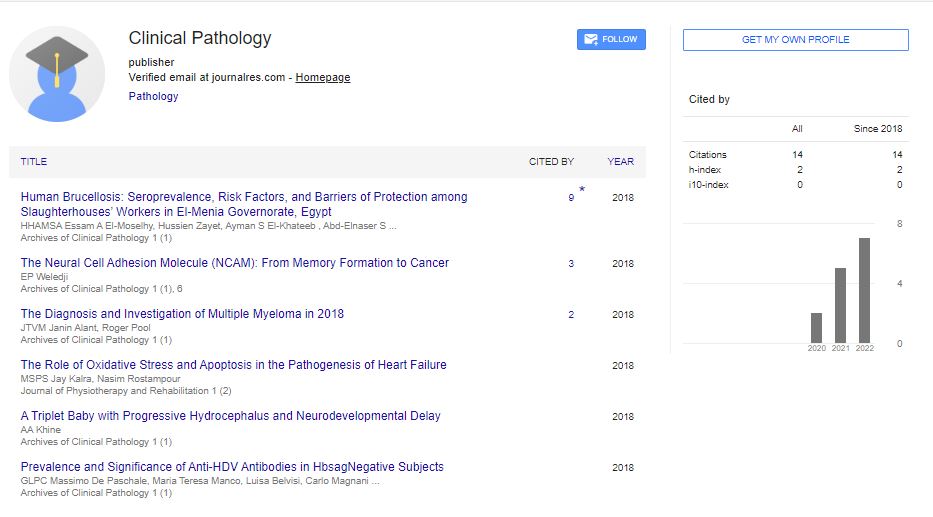Commentary, Arch Clin Pathol Vol: 6 Issue: 1
Potential uses of Cytogenetics in Human Genetics and Disease Diagnosis
Joan Lee*
Department of Gynecology, National Yang Ming Chiao Tung University, Taipei, Taiwan
*Corresponding Author: Joan Lee
Department of Obstetrics and Gynecology, National Yang Ming Chiao Tung University, Taipei, Taiwan
E-mail: joanlee@gyn.62.tw
Received date: 20 February, 2023, Manuscript No. ACPY-23-93186;
Editor assigned date: 22 February, 2023, PreQC No. ACPY-23-93186 (PQ);
Reviewed date: 09 March, 2023, QC No ACPY-23-93186;
Revised date: 16 March, 2023, Manuscript No. ACPY-23-93186 (R);
Published date: 23 March, 2023, DOI: 2324-8955/acpy.05.03.100073
Citation: Lee J (2023) Potential uses of Cytogenetics in Human Genetics and Disease Diagnosis. Arch Clin Pathol 6:1.
Description
Cytogenetics is a branch of genetics that deals with the study of chromosomes and their association with heredity, diseases, and variations. It has been an important tool in the field of human genetics and disease diagnosis, with numerous applications. Karyotyping is a cytogenetic technique used to analyze the number, size, and shape of chromosomes in a cell. This technique is performed on cells that are in the process of dividing, as chromosomes are most visible during this stage. Karyotyping is commonly used to diagnose chromosomal abnormalities, such as aneuploidies (abnormal number of chromosomes) and structural aberrations (changes in the structure of chromosomes). Fluorescence In-situ Hybridization (FISH) is a cytogenetic technique that is used to detect specific DNA sequences on chromosomes. This technique is based on the use of fluorescent probes that are complementary to specific DNA sequences. The probes are labelled with a fluorescent dye, which allows them to be visualized under a fluorescent microscope. FISH can be used to detect chromosomal abnormalities, including translocations, deletions, and duplications. It is also used in cancer diagnosis, where it can be used to detect gene fusions and copy number variations. One of the primary applications of cytogenetics is to diagnose chromosomal abnormalities and genetic diseases. Chromosomal abnormalities can occur due to changes in the number or structure of chromosomes. Some of the common chromosomal abnormalities include Down syndrome (trisomy 21), Turner syndrome (monosomy X), and Klinefelter syndrome (XXY). Cytogenetic analysis can detect these abnormalities, which can be helpful in the diagnosis and management of genetic diseases. Cytogenetics also plays an essential role in cancer diagnosis. Chromosomal abnormalities are common in cancer cells, and the identification of these abnormalities can help in the diagnosis, prognosis, and treatment of cancer. For instance, Chronic Myeloid Leukemia (CML) is characterized by the presence of the Philadelphia chromosome, which can be detected through cytogenetic analysis. The detection of the Philadelphia chromosome helps in the diagnosis and management of CML. Preimplantation Genetic Diagnosis (PGD) is a technique used to screen embryos for genetic disorders before implantation. Cytogenetics is used in PGD to detect chromosomal abnormalities in embryos. This technique is particularly useful for couples with a family history of genetic disorders or chromosomal abnormalities, as it allows them to select embryos free from these abnormalities for implantation.
Cytogenetics is also used in genetic counselling, which is a process that involves the identification of the risk of genetic disorders in families. Genetic counselors use cytogenetic analysis to determine the likelihood of chromosomal abnormalities and genetic diseases in a family. This information can help families make informed decisions about their reproductive options. Cytogenetics is used in prenatal diagnosis to detect chromosomal abnormalities and genetic diseases in foetuses. Amniocentesis and Chorionic Villus Sampling (CVS) are two common methods used for prenatal diagnosis. These procedures involve the collection of foetal cells, which are then analysed using cytogenetic techniques to detect any abnormalities.
Conclusion
Cytogenetics has numerous applications in human genetics and disease diagnosis. It is an essential tool for the detection of chromosomal abnormalities, genetic diseases, and cancer. It is also used in preimplantation genetic diagnosis, genetic counseling, and prenatal diagnosis.
